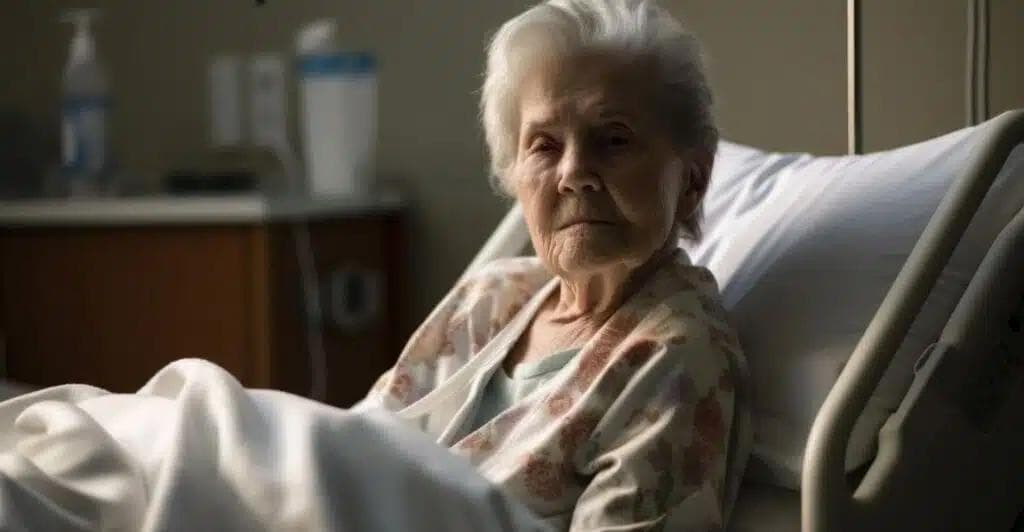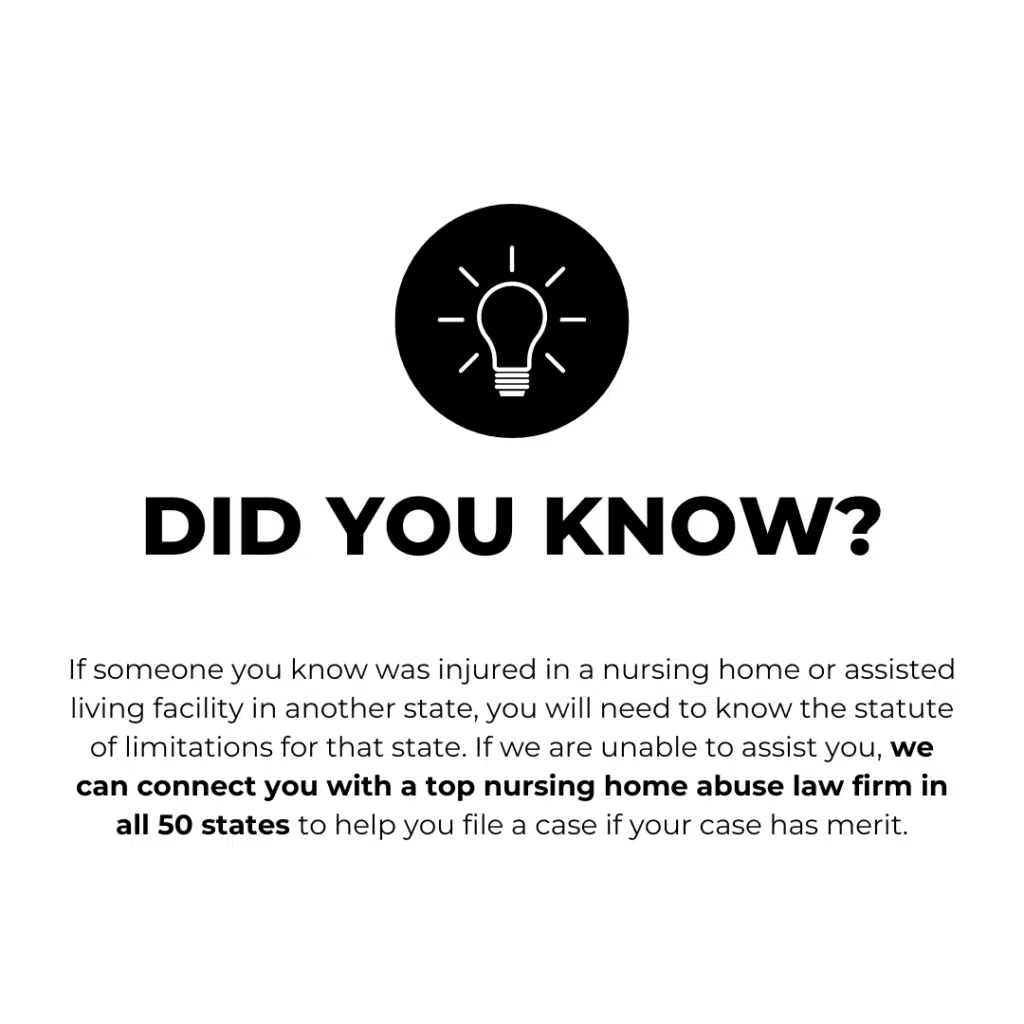
Nursing home abuse and neglect put vulnerable residents at serious risk, leading to malnutrition, dehydration, infections, and preventable injuries. When facilities fail to provide adequate care, residents suffer, and families are left feeling helpless. Lack of supervision, improper medical treatment, and unsafe conditions can result in devastating harm. Understanding the warning signs, knowing your legal rights, and holding negligent facilities accountable are crucial steps in protecting your loved ones. Learn how to take action and seek justice.
November 5, 2024
3 min
Nursing homes are places where our elderly loved ones should feel safe, respected, and cared for. The unfortunate truth is that not many nursing homes fail to meet this expectation. Instances of abuse and neglect occur far too often.
Beyond the physical and emotional toll, the effects of abuse in nursing homes affect families and communities, leaving lasting scars and breaking trust in the very institutions meant to provide support to those who need it the most. By shining a spotlight on the various types of abuse prevalent in nursing homes, we can ignite conversations, foster empathy, and inspire concrete steps toward prevention and intervention. It is not enough to simply acknowledge these abuses. We must actively work to dismantle the systems and attitudes that enable them to persist.

Abuse can occur in many different forms. It is crucial to keep an eye out to ensure our loved ones are being well-taken care of and safe.
Physical Abuse – Physical abuse within nursing homes is a distressing reality that inflicts profound physical and emotional harm on residents. This form of mistreatment involves purposefully causing physical harm or injury by caregivers or other residents, resulting in visible injuries such as bruises, cuts, fractures, and welts. Abuse may also include caregivers depriving residents of goods and services they need to maximize their health and well-being. The repercussions of physical abuse extend far beyond the surface wounds, often leaving lasting scars on the psychological and emotional well-being of victims.
Common signs of physical abuse can also include:
The Centers for Disease Control and Prevention (CDC) reports a concerning trend of increasing physical elder abuse. From 2002 to 2016, over 600,000 older adults sought treatment in emergency departments for nonfatal assaults. Shockingly, during this period, more than 19,000 homicides of older adults were reported, underscoring the severity and impact of physical violence against the elderly. These alarming statistics underscore the urgent need for enhanced prevention, intervention, and support systems to address physical elder abuse effectively.
Neglect of Basic Needs – What we consider neglect is often a form of abuse. Residents who experience neglect may suffer silently, their voices muted by physical frailty, cognitive impairment, or fear of reprisal. Consequently, the effects of neglect can manifest gradually, leading to a gradual deterioration in physical and mental well-being.
Malnutrition and dehydration are among the most common consequences of neglect, as residents may not receive adequate nourishment or hydration due to oversight or neglectful practices.
Untreated medical conditions and infections commonly result from residents receiving timely medical attention or follow-up care, exacerbating existing health issues and compromising their quality of life. Neglect of hygiene needs can lead to unsanitary living conditions, increasing the risk of infections, bedsores, and other preventable health complications. Poor oral care (keeping the mouth clean) can lead to infections in the mouth and also a kind of lung infection called aspiration pneumonia.
Residents who are left in soiled clothing or bedding may experience discomfort, loss of dignity, and diminished self-esteem, further perpetuating the cycle of neglect and degradation.
Other signs of Neglect in Residents May Include:
The signs of neglect are varied and often subtle. They require immediate intervention to ensure the safety and well-being of vulnerable individuals. By fostering a culture of accountability, compassion, and dignity within nursing homes, we can strive to prevent neglect and uphold the rights and dignity of every resident in their golden years. It is imperative that we listen to their voices, amplify their concerns, and take decisive action to ensure that neglect of basic needs becomes a relic of the past.
Sexual Assault – Sexual assault in nursing homes represents a horrifying betrayal of trust and a grave violation of the rights and dignity of vulnerable residents. This horrendous form of abuse involves non-consensual sexual contact or exploitation perpetrated by staff members, fellow residents, or visitors within the confines of the facility. Elderly individuals residing in nursing homes are particularly susceptible to sexual assault due to factors such as physical frailty, cognitive impairment, and dependency on caregivers for assistance with daily activities. The consequences of sexual assault can be devastating, leading to profound psychological trauma, physical injuries, and a loss of autonomy. Victims of sexual assault in nursing homes often suffer in silence, hindered by fear, shame, and a sense of powerlessness.
Signs of sexual abuse in nursing home residents may include:
It’s essential to approach any suspicions of sexual assault with sensitivity, respect, and urgency. Reporting concerns to nursing home management or appropriate authorities is needed to promote safety and well-being of residents and to hold perpetrators accountable for their actions. Providing support and resources for survivors of sexual assault is also essential for their recovery and healing process.
Emotional Abuse – Emotional abuse in nursing homes is a deeply troubling reality that inflicts significant harm on elderly residents, affecting their mental and emotional well-being. This form of mistreatment involves the infliction of psychological pain or distress through verbal or non-verbal means, including intimidation, humiliation, manipulation, or isolation. Elderly individuals in nursing homes are particularly vulnerable to emotional abuse due to factors such as dependency, frailty, and isolation from support networks.
In a survey of 577 nurses and nursing aides working in long-term care facilities, a staggering 81% reported witnessing emotional elder abuse. Shockingly, the study also found that 40% of staff admitted to perpetrating at least one incident of emotional abuse within a 12-month period.
Signs of emotional abuse in residents may include:
Financial Exploitation – Financial exploitation in nursing homes is a reprehensible form of abuse that involves the unauthorized or improper use of an elderly resident’s funds, property, or assets for personal gain. Caregivers, staff members, or even other residents may exploit vulnerable individuals by coercing them into signing financial documents, stealing money or valuables, or exerting undue influence over their financial decisions. This exploitation can leave elderly residents financially devastated, jeopardizing their ability to afford necessary care and support, and undermining their sense of security and trust in their caregiving environment. Preventing and addressing financial exploitation requires vigilant oversight, robust regulatory measures, and proactive education for residents and caregivers alike.
Signs of Financial Exploitation in nursing homes may include:
Fraud and financial abuse emerged as some of the most frequently associated crimes with elder neglect and abuse in both 2019 and 2020.
Elder Abandonment – Elder abandonment, whether in nursing homes or assisted living facilities, can have devastating consequences for the physical and emotional well-being of the elderly residents left without adequate care and support. It can lead to feelings of fear, isolation, and helplessness, exacerbating existing health conditions and diminishing their overall quality of life. Detecting and addressing cases of abandonment require vigilant monitoring and intervention to ensure the safety and dignity of older adults in long-term care settings.
Signs of Elder Abandonment:
The prevalence of abuse and neglect in nursing homes is a major concern that demands urgent attention and action from individuals, families, caregivers, the government, and society as a whole. The wide array of abuses, including physical abuse, emotional abuse, sexual abuse, financial exploitation, and elder abandonment, underscores the urgent need for comprehensive reforms and safeguards to protect the rights and dignity of elderly residents. By raising awareness, fostering empathy, and advocating for systemic changes, we can strive to create safer and more compassionate environments within nursing homes.
Disclaimer: This information is provided for informational purposes only. Nothing in this article should be construed as providing legal advice or the creation of an attorney client relationship. Laws are updated frequently and change from state to state. If you desire legal advice, you can contact Michael Hill Trial Law at www.protectseniors.com, send an email to info@protectseniors.com, call (800) 659-2712 to begin an investigation or contact another attorney.